AMD Ryzen 7 5800X Review
Can this jack-of-all-trades processor compete with Intel Rocket Lake?
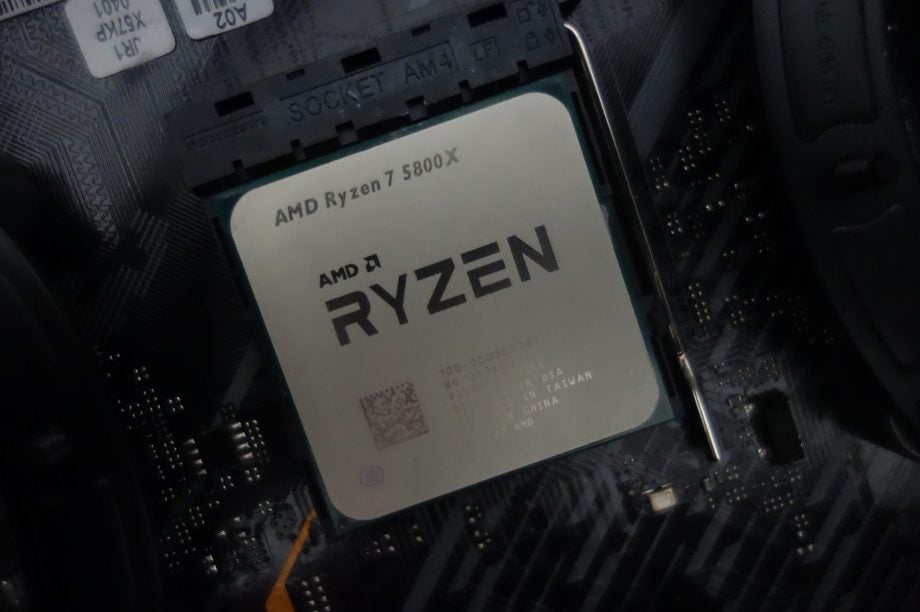
Verdict
The AMD Ryzen 7 5800X is a superb all-rounder desktop processor, offering a competitive performance for both content creation and gaming. However, there are better value alternatives that specialise at specific workloads, so the Ryzen is only worth considering if you need an all-purpose performance.
Pros
- Fantastic all-round performance
- Great multi-threaded performance
- Low power consumption
- Supports PCIe 4.0
Cons
- Fairly expensive
- Intel still has the edge for gaming
Key Specifications
- Review Price: £420
- 3.8GHz base clock
- 4.7GHz max clock
- 8 cores, 16 threads
- 7nm Zen 3 arhitecture
- Socket AM4 support
- PCIe gen 4 support
The AMD Ryzen 7 5800X is one of Team Red’s latest desktop processors, proving to be one of the most affordable Zen 3 chips currently on offer.
While most desktop processors generally try to excel at one specific workload – whether that’s content creation, gaming or even productivity – the Ryzen 7 5800X looks to be a jack-of-all trades chip that can do it all at a competitive standard.
With 8 cores, 16 threads and max clock speeds of up to 4.6GHz, this Ryzen processor looks to have all of the spec credentials to challenge Intel’s Rocket Lake CPUs, even if it’s a little bit behind the pace for gaming performance.
But if you want a processor that performs well at both content creation and gaming, then this may well be the best value option currently available.
Price and availability
The AMD Ryzen 7 5800X launched back in November 2020, and so is available to buy right now.
The new Ryzen chip can be found in various retailers, including Amazon, Currys and Overclockers. Prices typically float around the £420/$449 mark, depending on where you’re shopping.
Specs – Zen 3 provides a big performance boost
- Zen 3 architecture offers a sizeable performance boost
- CPU specs are very competitive with Intel
- Shares same class-leading features as Ryzen 3000 series
The AMD Ryzen 7 5800X desktop processor is built upon Zen 3 architecture with a 7nm process.
AMD’s new Zen 3 architecture is mighty impressive, delivering a 19% boost to the instructions per cycle (aka IPC) which essentially results in a more powerful and efficient performance.
AMD has also emphasised that Zen 3 processors will benefit from lower latency, with a new “unified complex” design reducing the communication time between cores. AMD suggests such modifications will boost the gaming performance, as Team Red looks to close the gap between itself and Intel.
AMD claims that the 7nm process has allowed the company to produce the most energy efficient Ryzen processors yet, with an apparent 24% improvement compared to the preceding generation.
But that’s enough about the Zen 3 architecture. How does the Ryzen 7 5800X compare to the competition?
| Base clock speed | Max clock speed | Cores / Threads | Thermal Design Power | |
| Ryzen 7 5800X | 3.8 GHz | Up to 4.7 GHz | 8 / 16 | 105W |
| Ryzen 7 3800X | 3.9 GHz | Up to 4.5 GHz | 8 / 16 | 105W |
| Ryzen 9 5900X | 3.7 GHz | Up to 4.8 GHz | 12 / 24 | 105W |
| Ryzen 5 5600X | 3.7 GHz | Up to 4.6 GHz | 6 / 12 | 65W |
| Intel Core i9-11900K | 3.5 GHz | Up to 5.3 GHz | 8 / 16 | 125W |
| Intel Core i7-11700K | 3.6 GHz | Up to 5.0 GHz | 8 / 16 | 125W |
| Intel Core i5-600K | 3.9 GHz | Up to 4.9 GHz | 6 / 12 | 125W |
The Ryzen 7 5800X’s closest competitor is the Intel Core i7-11900K. While the former costs around £420, the i7 Intel Rocket Lake chip can be purchased at a more affordable £390.
Looking solely at the specs sheet, it doesn’t seem like there’s much between the two chips, with an identical core and thread count at 8 and 16 respectively, while the Intel can reach slightly higher max clock speeds.
But a specs sheet only tells you half of the story, with the Zen 3 doing most of the heavy lifting in the background. Continuing from the strong foundations of the Ryzen 3000 series, the new Ryzen 5000 chips are particularly strong in multi-threaded performance, crushing Intel in content creation workloads without breaking a sweat.
It is, however, worth pointing out that the Ryzen 7 5800X does not feature integrated graphics, which means a discrete graphics card is required to get your PC up and running. I personally don’t think this is an issue, as such a high-end processor should be paired with a graphics card to get your money’s worth. But it’s still nonetheless an area that Intel has the upper hand.
Other than performance boosts and improved power efficiency, there aren’t really any game-changing Zen 3 features to talk about. Smart Access Memory is a fantastic new technology that increases the amount of graphics card memory the processor can tap into, but it’s now available for Ryzen 3000 chips which reduces the incentive to upgrade.
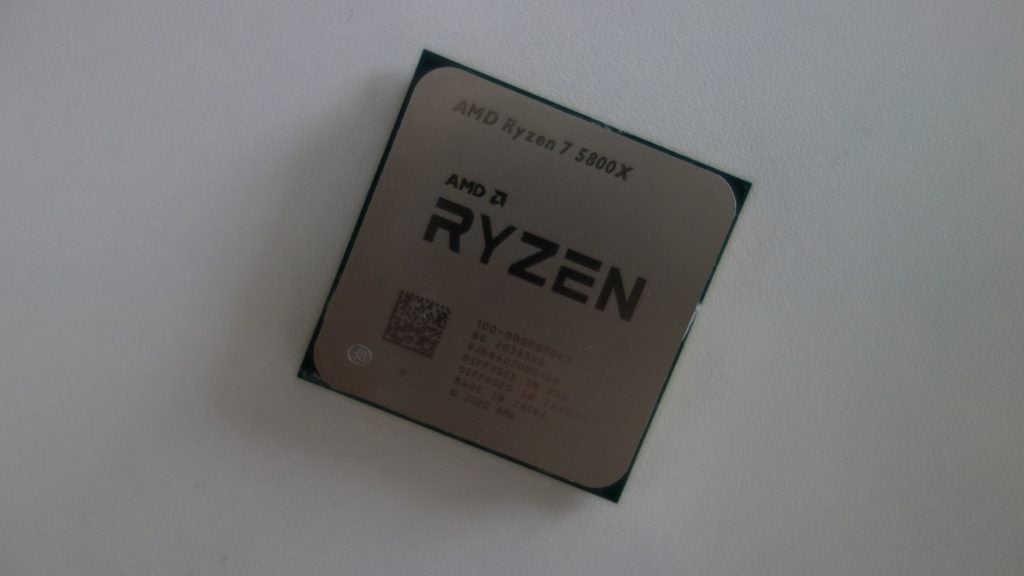
AMD processors also already offer support for PCIe 4.0, which raises the performance ceiling for compatible next-gen SSDs. Intel took a long time to catch up with the particular feature, but now does so with the Rocket Lake family.
The lack of exciting new Zen 3 features isn’t really a problem in my mind, as Zen 2 was so ahead of the curve that AMD’s already providing the most advanced CPU technologies currently available.
One aspect that should not be undervalued is that Ryzen 5000 processors don’t require a new motherboard chipset. The AMD Ryzen 7 5800X will work with any 500-series motherboard following a BIOS update, which means you probably won’t have to purchase a new ‘board when upgrading from Ryzen 3000.
The one disappointment here is that AMD isn’t bundling a Wraith Stealth with the AMD Ryzen 7 5800X, which is a big change from previous generations. I can understand the logic here, as you probably already own a cooler if you plan on upgrading an existing system, but it’s still a kick in the teeth for those looking to build their very first gaming PC.
Test setup – How we benchmarked the processor
It’s always important to ensure a fair testing methodology when reviewing processors, so I made sure to keep all of the components consistent (other than the motherboard when swapping between AMD and Intel) when comparing the various processors.
You can see the PC build I used for testing below:
- Intel Motherboard: ROG Maximus XIII Hero
- AMD Motherboard: TUF Gaming X570-Plus Wi-Fi
- RAM: 16GB (2x 8GB)
- GPU: AMD Radeon RX 6800
- Cooler: Noctua NH-D15 chromax.black (single fan)
- SSD: ADATA XPG SX8200 Pro 1TB M.2 Gaming SSD
- OS: Windows 10 Home
I chose a selection of both Intel Rocket Lake and Ryzen 3000 processors to compare against the Ryzen 7 5800X. I, unfortunately, don’t have access to other Ryzen 5000 chips right now, but I’m looking to call more in very soon.
I also selected a wide variety of benchmark tests to ensure I was pushing each processor to the limit for different workloads: PCMark 10 and Geekbench 5 for general performance, Cinebench R23 for content creation and 3DMark Time Spy for gaming.
For an even deeper look into gaming, I also used various in-game benchmarks to get a good idea of the real-world performance of the CPUs. I don’t have access to a 4K monitor due to Covid restrictions, but will update this review with the 4K results when possible.
It’s also worth remembering that the performance can be affected by future driver updates, so it may not be possible to replicate these results for yourself. With all of the technical stuff over and done with, let’s get to the benchmark results!
Performance – A jack-of-all-trades processor
- Ryzen 7 5800X offers a high performance across the board
- Intel still has the edge when it comes to gaming
- Multi-threaded performance is AMD’s greatest strength
The AMD Ryzen 7 5800X doesn’t really excel at any specific workload, but offers a very competitive performance across the board.
Gaming performance is solid, but the Intel Core i5-11600K offers slightly better results at a considerably cheaper price. And while AMD is once again the leader for multi-threaded workloads, the previous-gen Ryzen 9 3900X is a better CPU pick for content creation thanks to its additional cores and threads.
But while there are more affordable chips that can out muscle the AMD Ryzen 7 5800X, there isn’t a rival option that’s as rounded as this Zen 3 processor. If you want a desktop CPU that provides a competitive performance in both content creation and gaming, the AMD Ryzen 7 5800X is arguably your best option.
But don’t take my word for it. Check out all of the benchmark results below to see for yourself:
PCMark 10 Extended
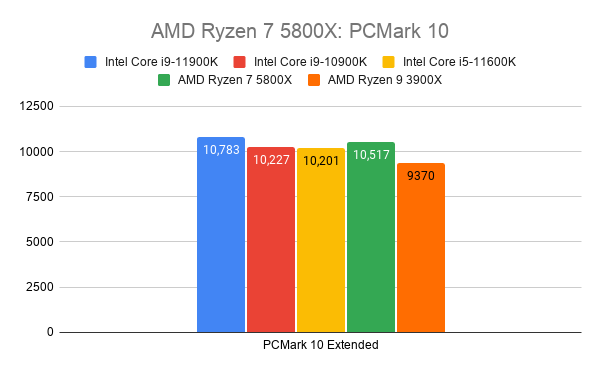
PCMark 10 offers a look at the general performance of a processor, refraining from focusing on one specific workload.
The AMD Ryzen 7 5800X performed very well here, ranking second in the group test. Only the Intel Core i9-11900K managed to top it, but that also costs £100 more despite being very little between them.
This emphasises that the Ryzen 7 5800X is a great all-rounder processor, proving a good option for those who don’t need a CPU exclusively for a specific workload.
Geekbench 5
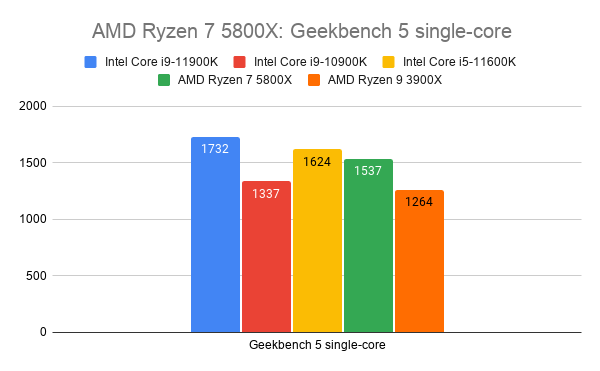
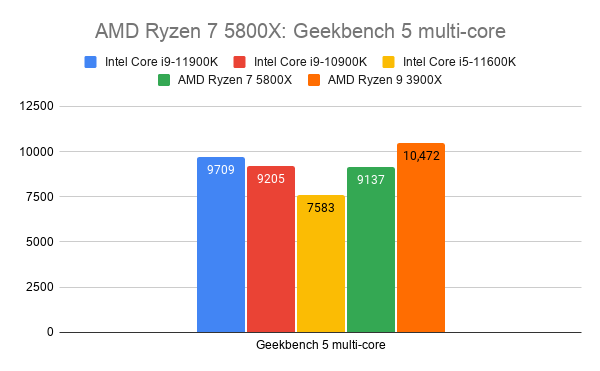
Geekbench 5 is like PCMark 10 in that it evaluates general performance, but also breaks the figures down into ‘single-core’ and ‘multi-core’ to provide an insight into a processor’s strengths and weaknesses.
These results show Intel Rocket Lake excels at single-core performance, while the Ryzen 7 5800X is more competitive at multi-core performance. Its multi-core performance wasn’t as high as I expected, but with Geekbench being a short-burst test, I assume it’s just not pushing the processor to the absolute limit like with the following test.
Cinebench R23
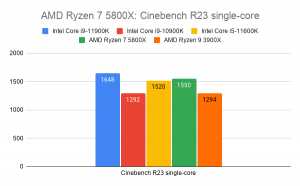
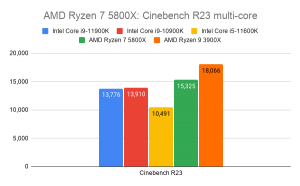
Cinebench R23 is a benchmark test that simulates a rendering workload, proving to be one of the very best tests for content creation performance.
Taking nobody by surprise, AMD once again rules the roost for multi-threaded performance, with the Ryzen 7 5800X seeing better results than the most powerful Intel Rocket Lake chip in the multi-core test.
However, the older and more affordable Ryzen 9 3900X processor beat the Ryzen 7 5800X by a considerable margin, making it the better value option if you want a processor solely for content creation and multi-threaded performance.
3DMark Time Spy
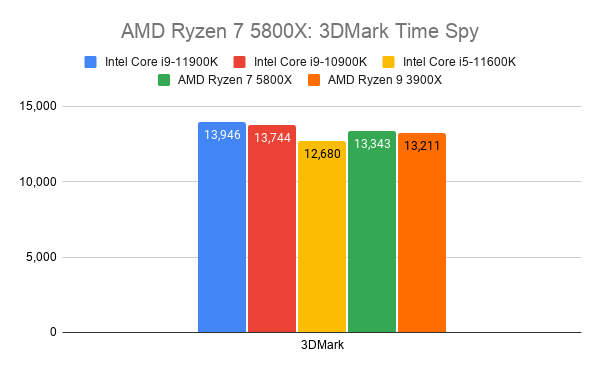
3DMark Time Spy is a synthetic benchmark test designed to evaluate the gaming performance of a processor. The AMD Ryzen 7 5800X saw an impressive result, but ranked right in the middle of our group test with Intel Rocket Lake leading the way.
That said, there wasn’t much of a disparity between any of the processors on test, showing how competitive gaming performance is these days. The Ryzen 7 5800X is a great gaming chip, just not the very best.
However, it’s always best to take 3DMark Time Spy results with a pinch of salt, as performance varies drastically on a per-game basis. For this reason, I also decided to benchmark individual games to get a better idea of performance.
Horizon Zero Dawn
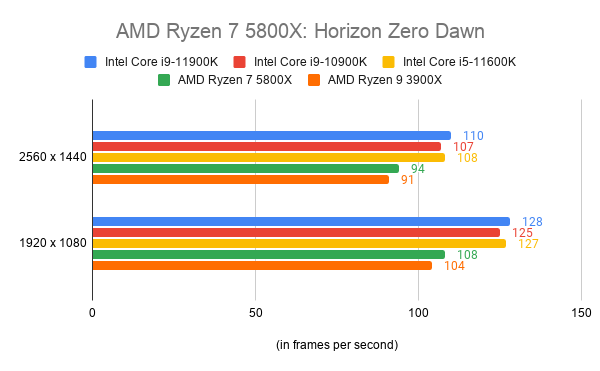
Horizon Zero Dawn is a modern action-adventure game that’s fairly taxing on components. The Ryzen 7 5800X delivered a great performance, but lagged slightly behind its Intel rivals in both the Full HD and Quad HD tests.
There was about a 10fps to 20fps difference with the Intel chips. That probably won’t be noticeable in real time, but it’s still a sizable Intel lead nevertheless.
The Intel Core i5-11600K in particular looks to offer better value, making it a more attractive proposition if you only care about gaming performance.
Borderlands 3
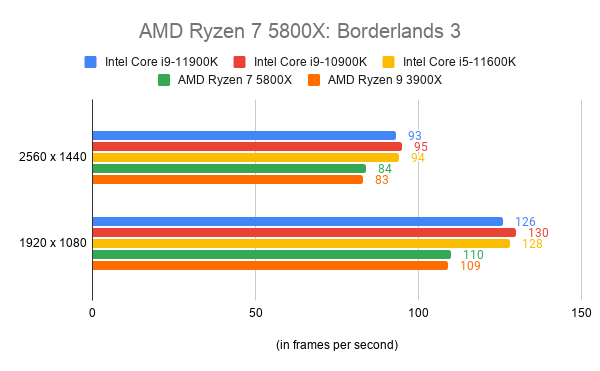
Borderlands 3 is one of the latest AAA shooters, and it’s proved to be very demanding on gaming PCs at high resolutions.
The benchmark test showed a very similar story to Horizon Zero Dawn, with Ryzen 7 5800X once again falling behind its Intel rivals by a decent margin.
Are you going to notice the 20fps difference when playing with a Radeon RX 6800 GPU? Probably not, as the frame rate is already so high, but Intel’s performance advantage could prove advantageous if you own a weaker GPU.
Dirt Rally
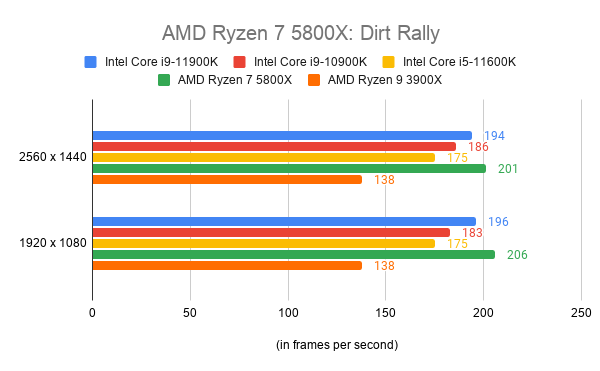
Dirt Rally launched back in 2015, which means it’s not very demanding and thus easier for PC systems to hit a high frame rate.
The results took me by surprise here, with the Ryzen 7 5800X leapfrogging the Intel competition to deliver the best results in the group test. This suggests the Ryzen chip is at its best when running video games that aren’t particularly taxing, which could potentially be beneficial to eSports players.
The Dirt Rally result also emphasises that the Ryzen 7 5800X is a better gaming CPU option than the cheaper Ryzen 9 3900X, with a whopping 68fps gulf between them.
Total War: Warhammer 2
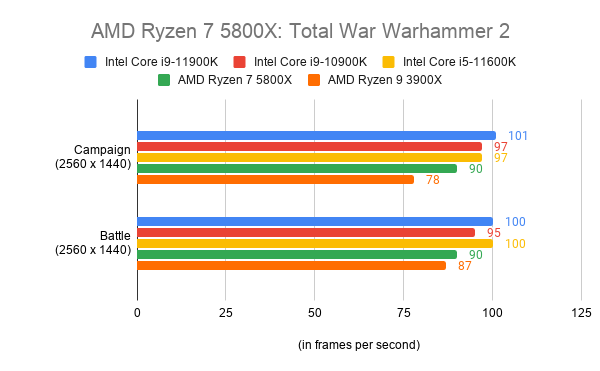
Total War: Warhammer 2 is one of the most popular strategy games currently available, and is therefore a good benchmark test to use in our CPU group test. I included results for both the campaign and battle benchmarks, both of which are in Quad HD resolutions.
The Ryzen 7 5800X performed very well in these tests, although still couldn’t quite beat Intel’s processors. The Ryzen was only behind by a 10fps margin however, so the difference in real-time performance will be minimal.
Again, Intel is technically offering the best performance for gaming, but the Ryzen 7 5800X is still delivering a very similar performance.
Civilization VI
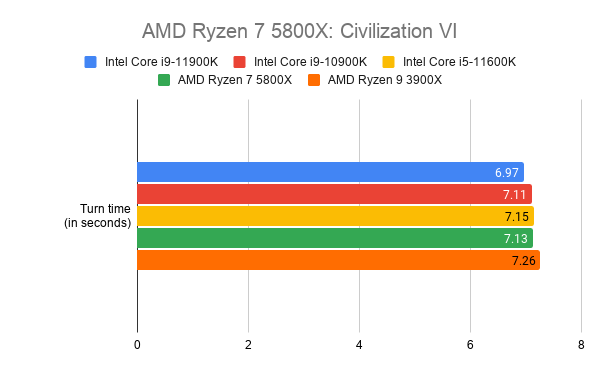
Civilization VI has a slightly different benchmark test to all of the other games on test, as it measures how long it takes for the AI to calculate decisions rather than outputting an average frame rate. The shorter the time the better, as it means you have to wait less time between turns.
The Ryzen 7 5800X came in at third place in this test, but it was only 0.16 seconds behind the leading i9-11900K. Such a small time difference is hardly going to make an impact on your experience, so it’s safe to say the Ryzen 7 5800X offers class-leading performance when playing Civilization VI.
Power consumption and heat – A power-efficient performance
- Power efficiency is incredibly good here
- You’ll need a top-notch cooler for an optimised performance
It’s not just the performance results that are important for desktop processors. The power consumption and temperature are also handy to know, as they may determine what kind of PSU and cooler you’ll need to get your system running at optimal performance levels.
I used a power meter to determine the power consumption, conducting two separate tests: idle and a stress test that involved picking out the peak wattage while running the Cinebench R23 multi-core benchmark.
| AMD Ryzen 7 5800X | AMD Ryzen 9 3900X | Intel Core i5-11600K | Intel Core i9-11900K | Intel Core i9-10900K | |
| Idle Power Draw | 68.6W | 65W | 64W | 67.2 W | 59W |
| Cinebench Power Draw | 189.5 W | 208.5W | 213.5W | 335W | 262W |
The Ryzen 7 5800X performed exceptionally well here, with the lowest power consumption figure of the entire group test when put under pressure. It did, admittedly, also have the highest power consumption while the computer was idle, but it was only narrowly ahead of the competition in this respect.
This means you probably won’t have to buy an ultra-expensive PSU in order to get the AMD Ryzen 7 5800X running at optimal speeds, which is a big plus in my book.
The AMD Ryzen 7 5800X wasn’t so impressive in the thermal test, hitting a toast peak temperature of 86°C when using the Noctua NH-D15 chromax.black with a single fan setup.
| AMD Ryzen 7 5800X | AMD Ryzen 9 3900X | Intel Core i5-11600K | Intel Core i9-11900K | Intel Core i9-10900K | |
| Idle temperature | 39°C | 41°C | 24°C | 34°C | 36°C |
| Stress test temperature | 86°C | 80°C | 67°C | 87 °C | 80°C |
That’s similar to the Intel Core i9-11900K’s thermal performance, which has been criticised for requiring a high-end cooling solution to get an optimal performance.
Of course, this isn’t a concerning result that may cause your computer to catch on fire, but it does mean you’re unlikely to get a good overclocking performance without investing in an expensive cooling solution. Unfortunately, I was unable to test the overclocking performance due to time constraints.
AMD Ryzen 7 5800X conclusion
The Ryzen 7 5800X is an excellent all-round processor that doesn’t really excel at any specific workload, but offers a competitive performance in every area, including content creation, gaming and productivity.
If you only need a high-end desktop CPU for gaming, then the Intel Core i5-11600K is a better value buy, while the Ryzen 9 3900X is a more cost-effective alternative for multi-threaded workloads. But if you want a processor that does it all without compromises, then Ryzen 7 5800X is your best bet at this price point.
Its low power consumption and compatibility with old AMD-supported motherboards also means you won’t have to pay lots of money for other components when upgrading. Although the high temperature is something to keep an eye on if you don’t already own a top-notch cooling solution.
You should buy the AMD Ryzen 7 5800X if…
- You want an all-purpose desktop processor. The AMD Ryzen 7 5800X doesn’t really excel at any specific workload, but offers a highly competitive performance across the board, making it a good option for those who need a computer for multiple use cases.
- You care about power consumption The Ryzen 7 5800X has a wonderfully low power consumption despite offering such a high performance. If you don’t own a high wattage PSU or simply care about minimising your energy bill, then this is a leading choice.
- You want to futureproof your system The AMD Ryzen 7 5800X offers support for PCIe 4.0, while also maximizing the performance with current generation GPUs thanks to AMD Smart Access Memory. These features will ensure your system is futureproofed for years to come.
You shouldn’t buy the AMD Ryzen 7 5800X if…
- You want a desktop CPU just for gaming If you’re not bothered about content creation or a powerhouse productivity performance, and only care about maximising your gaming experience, then the Intel Core i5-11600K offers superior value.
- You already own a Ryzen 3000 processorThe new Zen 3 architecture is undoubtedly great, but there’s arguably not enough of a generation-on-generation performance to justify a Ryzen 7 5800X purchase if you already own a Ryzen 3000 processor. The previous-gen chips also support the same innovative features such as PCIe 4.0 and AMD Smart Access Memory.


